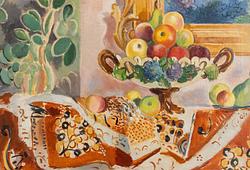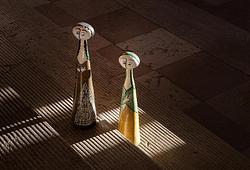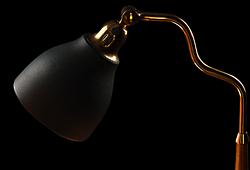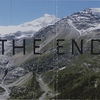Ed Ruscha
"The End #87"
Signed Ed Ruscha and dated 2010. Marked with "Studio #D.2010.14" on label verso. Acrylic, ink and surface abrasion on photography mounted on Museum Board paper 31.8 x 38.5 cm.
Provenance
Gagosian Gallery, Los Angeles.
Exhibitions
Wetterling Gallery, Stockholm, "Ed Ruscha", 27 May - 2 July 2010.
Literature
Wetterling Gallery, "Ed Ruscha" (WG 37), 2010, exhibition catalogue, illustrated.
More information
The End #87 belongs to a series of works by Ruscha that incorporates the phrase ‘The End’, the earliest of which dates from the early 1980s.
The writer and curator Alexandra Schwartz has noted that Ed Ruscha was an enthusiastic moviegoer as a child in Oklahoma City, and that: ‘Upon arriving in Los Angeles in the late 1950s, he continued to frequent the cinema, his favorites being old Hollywood movies’; the artist confirms this, saying: ‘Old movies, because of their age, were appealing to me. The imagery that comes from it and the flaws and scratches all became part of my interest in the whole thing. They are moving pictures. It’s a profound medium, not unlike painting. Painting is all static but movies … they move.’ (Quoted in Alexandra Schwartz: "Ed Ruscha's Los Angeles" 2010, page 92.)
The End #87 depicts a film strip at the closing credits of a motion picture, complete with celluloid scratches and the text ’The End’. The work initially looks like a close-up representation of an actual piece of film; however, the sprocket perforations and soundtrack which run down a film strip’s edges are missing. The work therefore mimics film as it has been projected onto a cinema screen.
Ed Ruscha's artistic identity is intimately entwined with Los Angeles and its film industry, his work taking inspiration from the sprawling west coast metropolis and its role as producer of Hollywood myth and fantasy. Informed by the look and feel of film, The End #87 provokes an array of cinematic associations and memories. This work is related to a number of different paintings, prints and drawings that Ed Ruscha executed during the 1990s and 2000s, all incorporating the text ”The End”, "End" or even "Fin”.
The curator Ralph Rugoff’s description of Ruscha’s 1991 large-scale painting The End (The Museum of Modern Art, New York) confirms the close similarities between works in the series; it states that The End is: "one of a series of canvases that portray scratched and scarred end titles from old movies, pay[ing] tribute to the imminent obsolescence of film technology.” (Ralph Rugoff: "Ed Ruscha: Fifty Years of Painting”, pages 23–24.)
The writer Mary Richards has also discussed the artist’s engagement with cinematic subject matter in ‘The End’ series, stating: "Just as Ruscha is interested in the “object” quality of words, these works show a fascination for the material aspects of cinema. The idea of “scratches on the film” recalls 1960s works by experimental film-makers such as Stan Brakhage and Bruce Conner, whose scratched, painted and collaged negatives created extraordinary visual effects." (Mary Richards: "Tate Modern Artists: Ed Ruscha”, page 119.)
Mary Richards thus links Ed Ruscha’s interest in the physical properties of film, a medium increasingly obsolete in the face of digital video and other movie-making technologies, to experimental film works contemporaneous with the very beginning of Ed Ruscha’s career, when film was a flourishing medium of newly-discovered artistic potential.

























